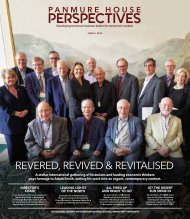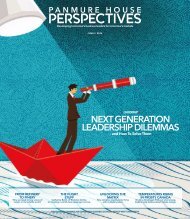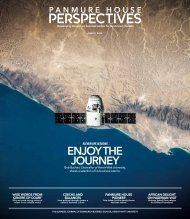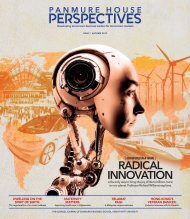Panmure House Perspectives - Issue 4, 2019
Panmure House Perspectives, the new international business journal of Edinburgh Business School, which showcases the best research undertaken by our doctoral students, interviews with major global business figures and viewpoints from leading academics from or own university and beyond.
Panmure House Perspectives, the new international business journal of Edinburgh Business School, which showcases the best research undertaken by our doctoral students, interviews with major global business figures and viewpoints from leading academics from or own university and beyond.
Create successful ePaper yourself
Turn your PDF publications into a flip-book with our unique Google optimized e-Paper software.
A PASSION FOR EDUCATION<br />
ECONOMICS WITH THE TRUTH<br />
DR CAROLINE HOWITT, the programme director of <strong>Panmure</strong> <strong>House</strong>,<br />
gives a taster of the seminars, symposia, Festival events and other<br />
activities bringing Adam Smith’s house back to intellectual life.<br />
<strong>Panmure</strong> <strong>House</strong> prepares to<br />
welcome<br />
you all<br />
hen Professor Heather<br />
W<br />
McGregor inherited the<br />
<strong>Panmure</strong> <strong>House</strong> project in<br />
2017 as Executive Dean of<br />
Edinburgh Business School,<br />
she was clear and decisive<br />
about its mission.<br />
The home of Adam Smith must become a<br />
global 21st century sanctuary for enlightened,<br />
collaborative, global socio-economic and<br />
geopolitical thought leadership. It should be a place<br />
to celebrate and consider Smith’s life and works and<br />
their relevance today and it must become a centre<br />
for research into sustainable capitalism, promoting<br />
the benefits of long-term investment and its<br />
relationship with radical technological innovation.<br />
Alongside, the house should be a venue<br />
for scholarship and debate, bringing together<br />
academics, business leaders and policymakers to<br />
influence tomorrow’s world, just as it did in Smith’s<br />
time.<br />
As the newly appointed programme director of<br />
<strong>Panmure</strong> <strong>House</strong>, it is my privilege to assist Professor<br />
McGregor in realising this vision.<br />
As recorded on pages 6-9 in this magazine,<br />
<strong>Panmure</strong> <strong>House</strong> was formally opened by former<br />
Prime Minister Gordon Brown, who spoke<br />
eloquently about its great potential as a renewed<br />
centre for the Scottish Enlightenment and its<br />
influence on a global stage.<br />
Our range of engagement programmes is now<br />
putting this into practice. From the Adam Smith<br />
Lecture Series, which will see Nobel Laureates<br />
deliver keynote lectures of global relevance, and<br />
the Visiting Fellows’ Programme, which brings<br />
academics to Edinburgh for several months of<br />
research and industry collaboration, to the suite of<br />
Fringe Festival Events (see sidebar) that are making<br />
the house accessible to the public.<br />
To inspire the next generation there is the<br />
<strong>Panmure</strong> Educational Outreach Programme, an<br />
initiative that allows schoolchildren to spend a<br />
day in the house learning about Smith’s life and<br />
works. The <strong>Panmure</strong> <strong>House</strong> Prize, a prestigious<br />
academic prize of $75,000, is to be awarded for the<br />
best scholarship into long-term investing, with the<br />
prize money dedicated towards furtherance of the<br />
winning research.<br />
The PhD Scholarship Programme will bring<br />
talented EBS scholars to <strong>Panmure</strong> <strong>House</strong> to conduct<br />
the second year of their research there.<br />
And, of course, there are the summits,<br />
seminars and debates, the lifeblood of<br />
<strong>Panmure</strong>’s day-to-day life, bringing<br />
together academia, industry and<br />
politics to debate and find solutions<br />
to today’s biggest issues. These<br />
are all supported by the Founder<br />
Sponsors’ Programme, made up<br />
of our selected corporate and<br />
governmental partners, which<br />
include the Scottish Government<br />
and six global businesses to date.<br />
Finally, there is the Society<br />
of <strong>Panmure</strong> <strong>House</strong> – the<br />
annual membership platform<br />
for supporters of our mission.<br />
Members have privileged access<br />
to news and events at the house,<br />
as well as a subscription to<br />
<strong>Panmure</strong> <strong>House</strong> <strong>Perspectives</strong>.<br />
For readers who would like further<br />
information on any of the above, or<br />
to join the Society of <strong>Panmure</strong> <strong>House</strong>,<br />
please visit www.panmurehouse.org.<br />
Alternatively, email panmurehouse@<br />
ebs.hw.ac.uk, or call me, Caroline Howitt,<br />
on 0131 451 3959.<br />
PANMURE HOUSE EDINBURGH FRINGE FESTIVAL<br />
PROGRAMME <strong>2019</strong><br />
The Butcher, the Brewer, the Baker… and the<br />
Commentator (above)<br />
Confused about money? Concerned about the<br />
economy? Join editor-in-chief of MoneyWeek and<br />
Financial Times columnist Merryn Somerset Webb and/<br />
or financial writer and comedian Dominic Frisby as they<br />
interview, talk over and argue with a well-known group<br />
of economics, politics and finance gurus (with a few<br />
comedians chucked in for fun). Got a burning question<br />
on anything discussed? Audience participation very<br />
welcome.<br />
August 3, 4, 7, 8, 9, 10, 11, 14, 15, 16, 17, 18, 20, 21,<br />
22, 23, 24, 25 at 2pm. Tickets cost £12.<br />
Adam Smith: The Invisible Hand<br />
Four actors present a dramatisation of the life<br />
and works of Adam Smith, performed in<br />
the house in which he lived and died. Join<br />
Jean Jacques Rousseau, Voltaire, Robert<br />
Burns and Smith’s mother, Margaret, for<br />
a journey that resonates from the 18th<br />
century to the present day.<br />
August 1 (preview), 2, 3, 4, 6, 7, 8, 9, 10, 11,<br />
13, 14, 15, 16, 17, 18, 20, 21, 22, 23, 24, 25<br />
at 4pm. August 3, 4, 10, 11, 17, 18, 24, 25<br />
at 12pm. Tickets cost £12.<br />
Dominic Frisby Presents Adam Smith:<br />
Father of the Fringe (left)<br />
Nowhere has Adam Smith’s invisible<br />
hand been harder at work than at the<br />
Festival itself. In Smith’s own front<br />
room, MoneyWeek’s Dominic Frisby,<br />
author of Life After the State and Bitcoin:<br />
The Future of Money?, presents a lecture<br />
on the economics of the Fringe and how it<br />
has proved the realisation of everything Adam<br />
Smith believed.<br />
August 9, 10, 11, 15, 16, 17, 18 at 12pm.<br />
Tickets cost £12.<br />
To book tickets for any of our shows, please visit<br />
www.edfringe.com<br />
he UK government has committed in law<br />
T<br />
to reducing CO 2 emissions by 80% by 2050<br />
compared to 1990 levels. Recently, many have<br />
reached the conclusion that this reduction is not<br />
enough, and that the UK must commit to net zero<br />
carbon emissions by 2050.<br />
While there are many areas of economic<br />
activity that contribute to CO 2 emissions, the<br />
biggest contribution is made by transport. This<br />
sets the context for the government’s latest<br />
initiative ‘Road to Zero’, which outlines potential<br />
pathways to net zero emissions from road freight.<br />
Road freight can be differentiated from<br />
passenger cars because it involves a driver who<br />
is usually paid, and furthermore, it is concerned<br />
with moving large weights or volumes over long<br />
distances. This makes road freight an energyintensive<br />
business, and for the last 100 years, the<br />
overwhelming majority of road freight vehicles<br />
have been powered by diesel internal combustion<br />
engines. Although diesel has an attractive energy<br />
density, it also generates large volumes of CO 2,<br />
and is, as such, not suitable for our future needs<br />
as a decarbonised society.<br />
Logistics operations are currently constrained<br />
by time (both in terms of the load leaving<br />
the warehouse and the preferred customer<br />
delivery time), the need to minimise inventory<br />
in the supply chain, and vehicle capacity. When<br />
considered together, these constraints provide<br />
a context for the planning of transport and<br />
warehouse operations; these limitations will<br />
change when vehicle charging times and reduced<br />
vehicle range are subsequently considered.<br />
ELECTRICITY PEAKS<br />
Despite this, electrification is generally accepted<br />
as the long-term solution for the decarbonisation<br />
of road transport; this is because clean electricity<br />
generation is the cornerstone of decarbonising<br />
a wide range of economic activities such as<br />
manufacturing, the service sector, and even<br />
domestic buildings.<br />
KEEP ON TRUCKIN’<br />
An electrifying proposition<br />
PROFESSOR PHIL GREENING, Deputy Director of the Centre for Sustainable Road Freight and professor at<br />
Heriot-Watt University, considers the challenges and the options for future vehicle fleets in a zero carbon world.<br />
BY REMOVING THE COST OF THE<br />
DRIVER, “ WE DECREASE THE<br />
OPERATIONAL COSTS OF FREIGHT<br />
VEHICLES, BUT IF THAT VEHICLE IS<br />
ELECTRIC WE INCREASE ITS CAPITAL<br />
COSTS.<br />
”<br />
This presents two new challenges: firstly,<br />
the use of electricity in new applications, such<br />
as transport, will generate increased demand.<br />
However, the current demand for electricity is<br />
defined by peaks that are multiples of average<br />
demand, occurring in the morning and in the<br />
evening. During the rest of the day there is<br />
surplus generating capacity which could be<br />
deployed to provide electricity for transport.<br />
NEW SUBSTATIONS<br />
Secondly, the demand for transport electricity is<br />
also likely to occur in the morning and evening<br />
periods, requiring us to find ways of storing<br />
energy on vehicles so that we do not need to<br />
greatly increase electricity generating capacity.<br />
This forces us to consider the operational<br />
implications of electrifying road transport, and<br />
in particular the infrastructure requirements<br />
for charging large volumes of vehicles in<br />
short periods at centralised locations such as<br />
warehouses. This is not trivial: charging a fleet of<br />
50 articulated trucks from an existing warehouse<br />
supply will not be possible without significant<br />
reinforcement of the electricity distribution<br />
network, in particular the building of new<br />
substations.<br />
In short, the need to electrify road freight<br />
will require new vehicle designs that incorporate<br />
energy storage, which will require trade-offs<br />
between vehicle payload and the weight of<br />
batteries or other energy storage solutions. In<br />
any event, the development of suitable charging<br />
infrastructure presents a significant challenge.<br />
The cost of an electric freight vehicle is<br />
currently around double that of its diesel<br />
equivalent, and while the energy costs associated<br />
with electrification are considerably less than<br />
those associated with diesel, the energy costs of<br />
operating a diesel freight vehicle are only about<br />
20% of the overall operating costs, because<br />
the driver accounts for approximately 60% of<br />
these costs. In broad terms, there is no economic<br />
case to move road freight to electric vehicles,<br />
and therefore in the absence of government<br />
regulation and policy we can anticipate low<br />
adoption rates for electric freight vehicles. This<br />
will not address the environmental imperative.<br />
However, this narrative can be reshaped if<br />
we consider the opportunity of autonomous<br />
vehicles and their impact on cost structures. By<br />
removing the cost of the driver, we decrease the<br />
operational costs of freight vehicles, but if that<br />
vehicle is electric we increase its capital costs;<br />
over a seven-year life, the total cost of ownership<br />
will approximate to that of a current diesel truck.<br />
In essence, the lowest cost way of delivering the<br />
UK government’s ‘Road to Zero’ is to accelerate<br />
the development of autonomous electric freight<br />
vehicles.<br />
This will drive a revolution in material<br />
handling concepts, particularly in those parts of<br />
the supply chain closest to the consumer that<br />
currently rely on the driver to provide the means<br />
of loading and unloading the vehicle.<br />
Electrification of road freight presents<br />
many challenges but offers the elixir of<br />
decarbonisation, and a new competitive<br />
landscape in which some organisations will<br />
adapt to thrive and others will fall short.<br />
PROFESSOR GREENING is Deputy Director<br />
of the Centre for Sustainable Road Freight, a<br />
collaboration with the University of Cambridge,<br />
and Westminster University. The Centre has<br />
received a total of approximately £15 million<br />
research funding from EPSRC, Innovate UK,<br />
and industry partners.<br />
14 PANMURE HOUSE PERSPECTIVES ISSUE 4 ISSUE 4 PANMURE HOUSE PERSPECTIVES 15







